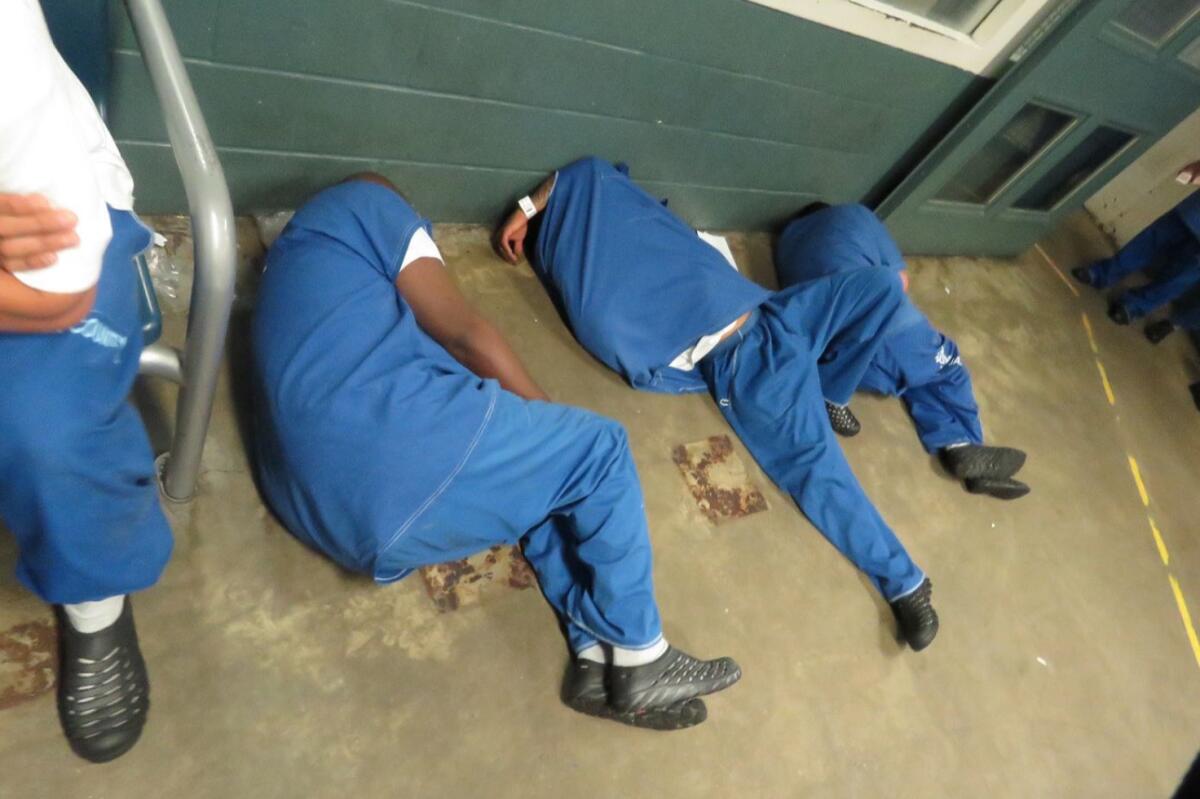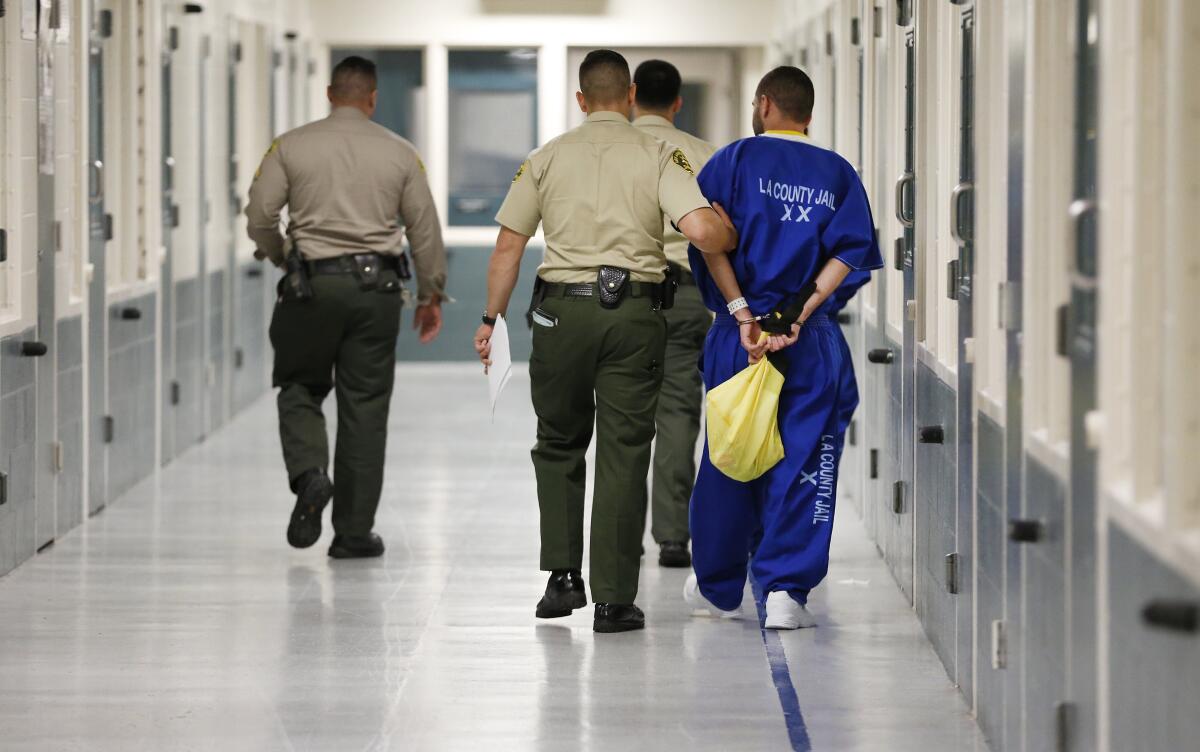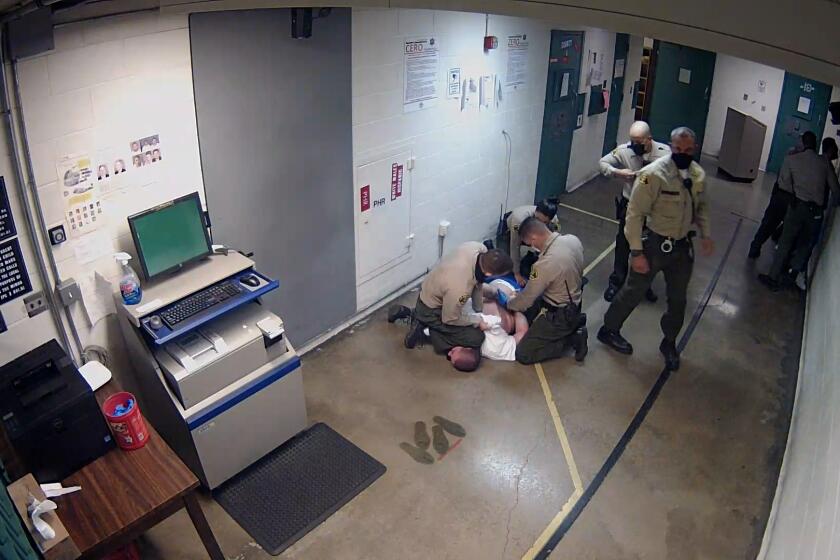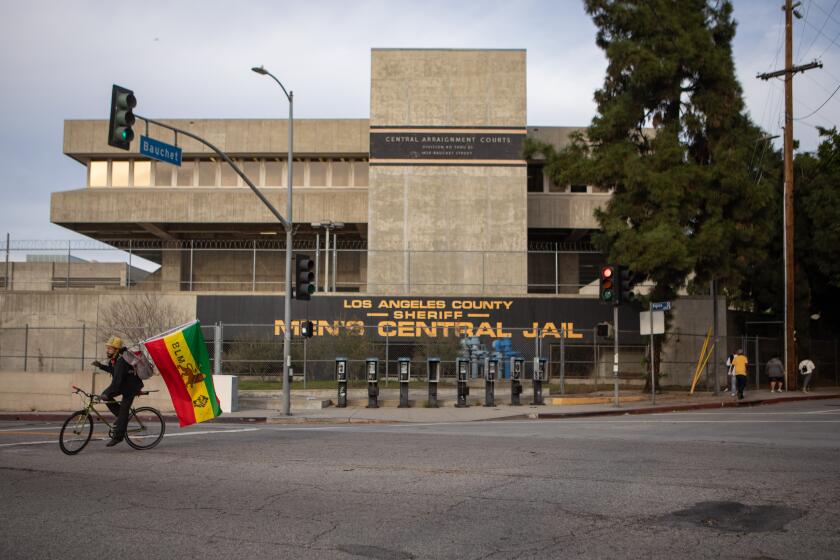‘Barbaric’ L.A. County jail conditions alleged as ACLU seeks federal intervention

Filth and degradation in the overcrowded Los Angeles County jail system has turned “barbaric” for a growing number of mentally ill inmates who are chained to chairs for days or left to sleep on a concrete floor without bedding, a civil rights group alleged Thursday.
Most of the inmates are recently arrested suspects who have not been convicted, and they are routinely denied clean water, functioning toilets, a shower, adequate food, or medication they need to treat schizophrenia and other serious conditions, according to the American Civil Liberties Union.
The ACLU asked U.S. District Judge Dean D. Pregerson for an emergency order to force Sheriff Alex Villanueva and the Board of Supervisors to clean up the “medieval” conditions of the jail system’s inmate reception center in downtown L.A.
The request revives a 1975 class-action suit that led to orders that the county end dangerous and inhumane practices that violate inmates’ rights.
About 120,000 inmates cycle through the jail system’s processing hub each year, according to the Sheriff’s Department. The portion of inmates with mental illness has grown substantially in recent years. Two men have died at the reception center since April, according to the ACLU.
Sheriff’s deputies regularly keep inmates chained to a chair or bench for days in the center’s clinic, the rights group alleged.
“This barbaric practice violates all basic norms of human decency and the constitution,” ACLU attorneys wrote in a court filing.
L.A. County sheriff’s officials attempted to cover up an incident in which a deputy knelt on the head of an inmate, according to records reviewed by The Times.
Inmate attorneys who visited the center cited “cuts, swelling, and bruising, consistent with prolonged handcuffing, on the wrists of a man” stuck on a bench for 99 hours. They saw one inmate chained to a bench urinating on the floor and another lying in a puddle of urine. An inmate recalled seeing a man defecate in a trash can, they said.
“When I was on the front bench the man chained to the chair next to me pulled his pants down and pooped on the floor,” inmate Tony Jones said in a sworn court statement filed by the ACLU.
“The feces stayed on the floor for two days. No one comes to clean the front bench area. I saw people pee into orange juice boxes. The area stank from the feces and pee.”

Mentally ill inmates reported that the jail failed to get them the psychiatric medicines that they take regularly to treat such conditions as schizophrenia, bipolar disorder or chronic PTSD.
“It is extremely dangerous to abruptly stop psychotropic medications rather than taper them,” the attorneys wrote, citing a psychiatrist’s warning of suicide and other risks.
If Pregerson approves the ACLU’s request for a temporary restraining order, it would bar the county from holding people in the reception center for more than 24 hours and from keeping inmates chained to a chair or bench for more than four hours.
It would also force the county to provide inmates clean drinking water, working toilets and access to adequate medical care.
A Villanueva spokeswoman, Sheriff’s Deputy Veronica Fantom, said by email: “We cannot comment due to pending litigation.”
The county remains out of compliance with the settlement’s main requirements: ensuring inmates with serious mental illnesses receive regular treatment, out-of-cell time and safe housing.
Barbara Osborne, communications director for Supervisor Sheila Kuehl, said the same thing. “Sorry I know that’s not very satisfying but that’s how we have to handle lawsuits,” she said.
The county administration released a statement saying it was committed to “implementing necessary improvements as quickly as possible,” but mentioned no specific changes to the jail’s intake center.
With 14,600 inmates, the L.A. County jail system is the largest in the country.
From Aug. 9 to Sept. 2, the ACLU’s court filings allege, the number of inmates held in the reception’s clinic for more than 24 hours, chained to chairs or benches in “deplorable conditions” with no bedding, reached as high as 252.
An inmate with diabetes got no insulin for 36 hours and “was only fed peanut butter and jelly sandwiches and orange juice that made his blood sugar spike and crash,” the attorneys reported. Other inmates said they got dehydrated after refusing to drink water from a sink that doubled as a toilet.
More to Read
Sign up for Essential California
The most important California stories and recommendations in your inbox every morning.
You may occasionally receive promotional content from the Los Angeles Times.













